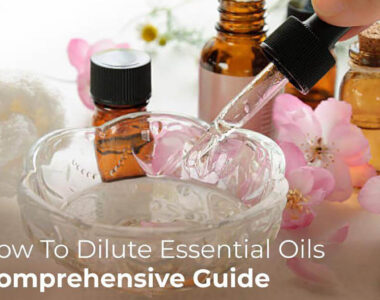Essential oils are incredibly powerful, and while they offer numerous benefits, they must be used carefully to ensure your safety and well-being. Here are some essential safety tips to keep in mind when using essential oils.
1. Dilute Essential Oils Properly
Essential oils are highly concentrated and can cause skin irritation, allergic reactions, or other adverse effects if used undiluted. Always dilute essential oils in a carrier oil (like jojoba, coconut, or sweet almond oil) before applying them to your skin. Refer to recommended dilution ratios based on the intended use and the user’s age or health condition.
General dilution guidelines:
- 1% dilution (mild): 6 drops of essential oil per 1 ounce (30 ml) of carrier oil.
- 2% dilution (moderate): 12 drops of essential oil per 1 ounce (30 ml) of carrier oil.
- 3-5% dilution (stronger): 18-30 drops per 1 ounce (30 ml) of carrier oil for therapeutic purposes.
2. Patch Test Before Use
Even if you’ve used an essential oil before, it’s always a good idea to do a patch test on a small area of skin before applying a new blend or oil. This will help you detect any potential allergic reactions or skin sensitivities.
How to Patch Test:
- Apply a small amount of diluted essential oil to the inside of your elbow or wrist.
- Wait for 24-48 hours and check for signs of irritation (redness, itching, burning, or swelling).
3. Use Essential Oils on the Right Parts of the Body
Some essential oils are not suitable for sensitive areas of the body, such as the eyes, ears, mucous membranes, or broken skin. Always be cautious when using oils around your face or near delicate areas, and avoid applying essential oils directly to sensitive spots like:
- Eyes and eyelids
- Genital area
- Mucous membranes (nose, mouth)
- Broken or irritated skin
4. Avoid Essential Oils During Pregnancy (Unless Safe)
Certain essential oils are considered unsafe during pregnancy due to their potential effects on hormones, uterine contractions, or blood circulation. Always consult with a healthcare provider before using essential oils during pregnancy.
Safe oils during pregnancy (with caution):
- Lavender
- Roman chamomile
- Ylang ylang
- Rose
- Frankincense
Avoid during pregnancy:
- Clary sage (can induce labor)
- Cinnamon
- Rosemary
- Sage
- Jasmine
- Thyme
5. Never Ingest Essential Oils Without Professional Guidance
Essential oils are not meant for internal use unless specifically directed by a qualified health professional. Some essential oils can be toxic when ingested, and even safe oils should only be consumed in very small amounts and under supervision. If you’re considering internal use for health purposes, always consult with a doctor or trained aromatherapist.
6. Be Aware of Photosensitivity
Certain essential oils, especially citrus oils, can increase your skin’s sensitivity to sunlight, leading to burns or pigmentation changes. This is known as photosensitivity. Avoid exposure to direct sunlight or tanning beds for at least 12-24 hours after using photosensitive oils.
Photosensitive oils include:
- Bergamot
- Lemon
- Lime
- Orange
- Grapefruit
- Mandarin
7. Keep Essential Oils Out of Reach of Children and Pets
Essential oils should always be stored safely out of reach of children and pets, as they are toxic if ingested in large quantities. Some oils, like peppermint or eucalyptus, can also cause respiratory distress in small children or animals.
Essential oils that can be dangerous to children and pets:
- Eucalyptus
- Peppermint
- Tea tree
- Cinnamon
- Wintergreen
If you suspect that a child or pet has ingested an essential oil, contact a medical professional immediately.
8. Use Caution When Using Essential Oils on Babies
Essential oils should be used very cautiously when it comes to babies (under 2 years old). Many oils are too potent and can irritate a baby’s sensitive skin or respiratory system. Always dilute extremely well and consult with a healthcare provider before using essential oils on babies.
Safe oils for babies (with caution):
- Lavender
- Chamomile
- Frankincense
Avoid oils for babies:
- Eucalyptus
- Peppermint
- Tea tree
- Cinnamon
- Rosemary
9. Do Not Use Essential Oils on Broken Skin or Open Wounds
Essential oils should not be applied directly to cuts, wounds, or broken skin as they can cause irritation, stinging, or more severe reactions. Use a mild dilution or avoid applying them until the skin has fully healed.
10. Be Mindful of Pre-existing Conditions and Medications
Some essential oils can interact with medications or exacerbate pre-existing health conditions. For instance, oils like rosemary and eucalyptus may interfere with blood pressure medications, and oils like peppermint may trigger acid reflux or exacerbate heartburn.
If you have any underlying health conditions (such as asthma, epilepsy, or high blood pressure), or if you are on medication, always consult your healthcare provider before using essential oils.
11. Avoid Heat and High Temperatures
Essential oils should be stored in cool, dark places away from heat sources (such as direct sunlight, stoves, or radiators), as heat can degrade their potency and therapeutic properties.
Proper storage:
- Keep essential oils in dark glass bottles to protect them from light.
- Store them in a cool, dry place to preserve their effectiveness.
12. Be Careful with Diffusers
While diffusing essential oils in the air can be an excellent way to enjoy their benefits, it’s important to follow the manufacturer’s instructions and not diffuse oils for extended periods. Over-diffusing can lead to headaches, nausea, or irritation.
Tips for safe diffusion:
- Diffuse for 15-30 minutes at a time, especially in small spaces.
- Ensure the room is well-ventilated, especially if diffusing for long periods.
- Follow the recommended number of drops (typically 5-10) for your diffuser’s size.
13. Understand the Quality of Essential Oils
Not all essential oils are created equal. To ensure safety and effectiveness, always purchase essential oils from reputable sources that provide clear information about the quality and purity of their products. Look for essential oils that are 100% pure, organic, and therapeutic grade.
Avoid oils that contain synthetic additives, chemicals, or diluents, as these can cause adverse reactions and diminish the therapeutic benefits of the oils.
Conclusion
Essential oils can be a wonderful addition to your wellness routine, offering everything from relaxation and mood enhancement to skin care and immune support. However, they are potent substances that require careful handling. By following these essential oil safety tips, you can ensure that you’re using essential oils effectively and safely.
Always remember to dilute, patch test, and consult professionals when in doubt. With proper knowledge and precautions, you can enjoy the therapeutic benefits of essential oils without any worries!



